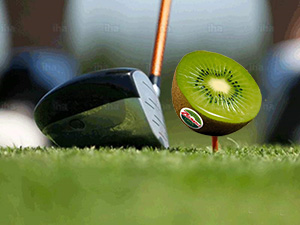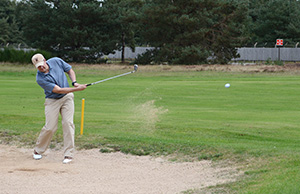Proper
The sport is physically and mentally draining, so nutrition should be as important with golf as it is with any other competitive sport.
During a competitive match, golfers can burn upwards of 2,000 calories by spending only four to five hours on the course. Golf is a low-impact sport with brief moments of high intensity during swings. Even so, your body is put through a lot during your time on a course.
Proper nutrition can be your competitive edge with just a bit of knowledge and careful planning. By understanding how certain nutrients affect your body and performance, you can coordinate meals and snacks to reach your full golfing potential. Proper nutrition can also help you to avoid fatigue and injury.
Foods to Keep up Energy and Focus

It’s not uncommon to lose focus and sharpness. It can ultimately cause you to flub on a swing or go over par. This feeling is because your body isn’t getting enough nutrients to keep going.
You can’t just eat anything you want and expect to feel at your best. This is especially true on competitive game days. You need careful planning to ensure that you are getting fuel before, during, and after the game.
Nutrient Density
You should always strive to eat foods that are rich is essential nutrients, minerals, and vitamins. Many processed junk foods are all calories with no substance. However, raw fruits and vegetables along with a lean protein source can provide you with fuel without the added calories.
Protein
Proteins are always recommended for building muscles. However, it’s good to go light on the proteins before and during a game. Protein sources should be lean to prevent fatigue from the consumption of too much fat. It should be combined with other essentials like carbohydrates. After a game, protein is important for recovery.
Carbohydrates
With golf, carbohydrates are your friend. You need carbohydrates throughout the game to keep your energy levels up throughout and avoid a crash. Your body will use the carbohydrates you consumed to fuel your performance. You should go with complex carbohydrates that digest slowly. This will ensure that your blood sugar levels don’t crash mid-game.
Antioxidants and Supplements
Foods that are rich in antioxidants like fruits can help promote excellent health. They help to keep your body safe from damage and speed up the recovery process. Additional supplements like omega fatty acids can also help your overall health. Some also provide you with a much-needed boost of energy.
[divider style=”solid” top=”20″ bottom=”20″]
Foods to Avoid
Certain foods can wreak havoc on your body and cause your performance to suffer. These foods shouldn’t be consumed on a regular basis and should be avoided completely before, during, and after a round of golf.
Refined Carbohydrates and Sugars
While complex carbs are great, refined carbs, sugars, starches, and certain grains are no good for your blood sugar levels. Consumption will cause your blood sugar to spike dramatically. They move fast throughout the blood, causing insulin levels to rise. As a result, your liver and muscles absorb the blood sugar. When this occurs, you’ll experience a physical and mental crash.
Junk Food
It should go without saying that fatty junk foods aren’t great for your body. On days that you spend on the course, junk foods are even more dangerous. They have very little nutritional content and can instead cause your blood sugar levels to spike. Stick with natural alternatives that are dense with nutrients.
Alcohol or Caffeine
While you can drink a cup of coffee at the beginning of your day, it’s not a good idea to consume it as you play. Hydration is very important when you’re on the course. Unfortunately, caffeine and alcohol are both diuretics. They cause you to lose more water than you’re consuming, which could quickly lead to dehydration.
What to Eat Before a Round of Golf

You should eat a large meal three to four hours prior to hitting the course. This should then be followed by a small snack an hour before the course.
Eating up to four hours before will allow you to build up your glycogen stores, fully digest your meal, avoid any potential gastrointestinal issues, and provide your body with ample time to absorb nutrients.
The main meal should be well-rounded. There should be plenty of complex carbohydrates, protein, and a few healthy fats. Carbohydrates should make up about 50% of the meal. Up to 330 grams of carbs can help improve your performance dramatically. The remaining 50% should be split evenly between lean meats and healthy fats like avocado or coconut.
About an hour before you hit the course, it’s good to consume a small snack that’s easy to digest. It should be high in carbohydrates. The purpose of this small snack is to prevent low blood sugar, prevent fatigue, and ensure that you’re neither hungry nor full. Good snacks can include yogurt, fresh fruit, or a whole wheat bagel.
What to Eat During a Game
To ensure that you don’t feel fatigued on the course, you need to eat between holes. There are a couple of different ways to consume nutrients during your game. Some golfers opt to go with two small snacks that they consume during the front and back nine.
Alternatively, some golfers choose to consume three snacks. The round of golf is split into three sets of six holes. You can eat a separate snack during the first six, middle six, and final six holes.
The types of snacks you should be eating during the game should have lean protein and carbohydrates. Snacks like whole grain crackers, peanut butter, and fruit all provide you with plenty of carbohydrates with the addition of supplementary nutrients. In total, you should be consuming between 30 and 35 grams of carbohydrates per hour you’re on the course. Beef jerky and lean chicken are also great for protein sources.
What to Eat After Playing

The lean protein you consume should be equivalent to a quarter of your daily requirement. You should strive to eat this meal as soon as possible after playing, as the body’s ability to recover decreases the longer you wait.
Water
You need to stay hydrated throughout the day. It’s even more crucial when you’re on the course. Golfers can lose up to 5 pounds of water weight during a single round of golf. Dehydration can occur fairly quickly. The symptoms of dehydration will have a drastic effect on your performance and overall health.

While it may be tempting to drink sports drinks throughout, this should be saved for the latter half of the game. The most important thing you need to be drinking is water.
Over to You
Eating right can help you perform at your best. With a bit of careful planning, you can prepare your mind and body to succeed. Start in the morning to get your nutrients in early.
Throughout the day, you can keep up the momentum with healthy snacks. After you beat the competition, you can reward yourself and promote recovery with the proper victory meal.
[divider style=”solid” top=”20″ bottom=”20″]






